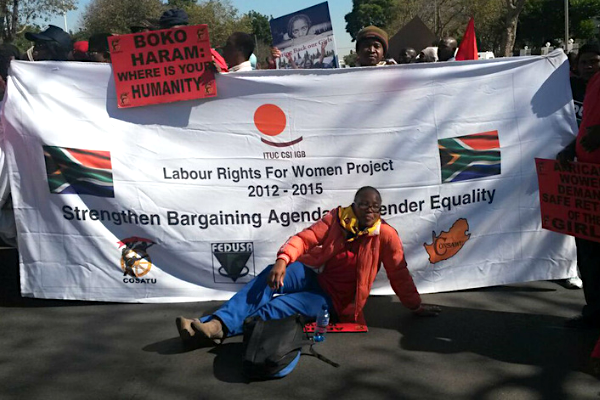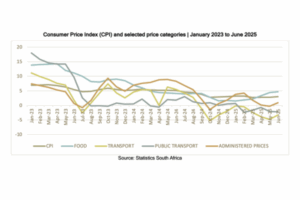The ITUC’s four-year campaign on women’s labour rights involved women workers in eight countries. The campaign aimed to empower young women in the formal and informal economy to defend their rights at work by organising them in trade unions, strengthening their participation and leadership in collective bargaining and social dialogue, and raising public awareness of key issues affecting women workers. Broadly, the Women’s Labour Rights Campaign, which ran from January 2012 to December 2015, aimed to reduce structural poverty by improving gender equality in the workplace and enabling the social and economic empowerment of working women.
Countries involved: India, Indonesia, Peru, Paraguay, Kenya, South Africa, Tanzania and Uganda.
In South Africa, the ITUC partnered with the Labour Research Service to implement the campaign in collaboration with trade union federations, including COSATU, FEDUSA and NACTU.
The aims of the Labour Rights for Women campaign in South Africa
- Tackle violence against women workers in the workplace
- To increase women’s participation in trade unions and women’s leadership/decision making in trade unions.
- Bargaining for gender equality
Achievements and successful strategies to reach women
- Raising awareness of women’s labour rights
A very important and successful element of the LRW campaign was awareness-raising. Across the eight countries, more than 35,000 women workers are now aware of their rights at work (equal pay, minimum wage, maternity protection, equal opportunities, health and safety, gender-based violence and sexual harassment) and the fact that joining a trade union can help them claim and enforce these rights.
"The Labour Rights for Women (LRW) campaign has opened up things that we didn't have in mind before. LRW has also given us space for dialogue and discussion so that when we go back to our federations we have answers to questions. We had a challenge that the sector dismissed in the form of sexual harassment. We needed space to engage. ...Now we're not just talking about the issue, it's a policy.
Gertrude Mtshweni, COSATU's National Gender Coordinator, explaining the impact of awareness-raising through the LRW campaign
2. Women organising women
Across the eight countries, more than 3,000 women improved their organising skills through training, workplace visits and other outreach activities. As a result, more than 25,000 women workers joined a union. Tanzania, Uganda, South Africa and India had the highest numbers of women joining unions.
3. Collective bargaining
Important lessons have been learnt about what needs to be done to improve the bargaining power of women workers, and that the inclusion of women in bargaining teams has a clear impact on the inclusion of gender-specific clauses in collective agreements.
clauses in collective agreements. Significant results in collective bargaining were achieved in South Africa, Indonesia, Tanzania and Uganda, both in terms of the number of women negotiators trained and included in negotiation teams and the number of collective bargaining agreements concluded with gender clauses.
4. Lobbying and social dialogue
In-depth studies produced by the unions, such as the
on the care economy, women’s employment and trade unionism, and maternity protection and equal pay, proved to be very useful advocacy
tools.
In South Africa, the LRW campaign called on the government and employers to do more to increase maternity benefits and provide childcare facilities. This call attracted considerable media attention. Under the banner of the LRW campaign, the four trade union federations also developed an advocacy campaign focusing on the rights of LGBTI workers at work. In addition the campaign team developed a relationship with the Commission for Conciliation, Mediation and Arbitration (CCMA) and now unions feel comfortable to approach the CCMA for help and training.
5. Leadership development
More women are taking up leadership positions in their unions in several of the countries involved in the campaign.
"I have been fortunate to use my voice as a coordinator for the Labour Rights for Women campaign in the Western Cape, representing FEDUSA at grassroots level. During our campaigns we have been able to discuss issues affecting women in the workplace such as sexual harassment, maternity protection, which led to the launch of our booklet, Child Care Facilities in the Workplace, and understanding the new amendments to the labour laws. We were successful in terms of attendance and media coverage. I use my position in the union to promote gender equality when I meet with members, both men and women."
Barbara Fourie, FEDUSA Provincial Executive Committee
Campaign resources
- Labour rights for women campaign | Global evaluation report
Key contact: Nosipho Twala | [email protected]
- Labour Rights for Women Campaign – Global evaluation report







